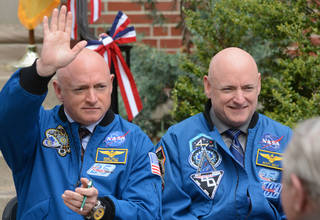Recently, I have read an article on Scott and Mark Kelly during the Twins Study by NASA. As a serious skeptic involving the potential for the human species to persist in space, I was surprised by the findings in study.

Scott and Mark Kelly
In the study, Scott was sent into low Earth orbit while his twin brother Mark stayed on Earth. The goal was to test the resiliency of the human body and see if Scott demonstrated any threats to human longevity in space. Outside of a enduring sickness as Scott’s body readjusted to life outside of free-fall, he was healthy in all of the other aspects measured. Discrepancies were found, but these were somewhat anticipated as the body struggles against the new harsh environment that Scott had been flung into. The most surprising find, as mentioned in the article, was that while in space Scott’s telomere’s were elongated but quickly shrank back down after landing. Telomere shortening is the chief indicator of aging, so the fact that they grew is odd especially considering lifestyles such as high stress and low exercise can increase the rate at which they shorten. Some suggestion indicates this could have been due to a higher exercise regime and a better choice of nutrition.
Moving forward past low Earth orbit, there are other factors to consider. Once astronauts leave the tail of the Earth’s magnetosphere, solar winds could affect the human body in ways that the Twin Study could not predict. Additionally, this study did not address how the human body would react to illnesses in space. Also, even if an individual is capable of living an long healthy life outside Earth, the prospect of procreation seems like a huge endeavor; however, a 2001 study on rats does suggest that birth is possible in microgravity.
Overall, I am excited to see so much progress towards pushing the species to new reaches of the universe, but certainly it will be a rough time for the first pioneers who set out with full knowledge that they will live out their lives without the comforts of Earth that humans have evolved to used to.
And this was just six months! A future trip to Mars will take between 6-8 months, and that’s only one way. I think the long-term effects on the human body from space travel will have to be carefully considered for future space exploration. With that said, the first trip to Mars will almost certainly not be a round trip visit (too expensive logistically). Perhaps some medical developments can help make the journey less harmful…
LikeLike